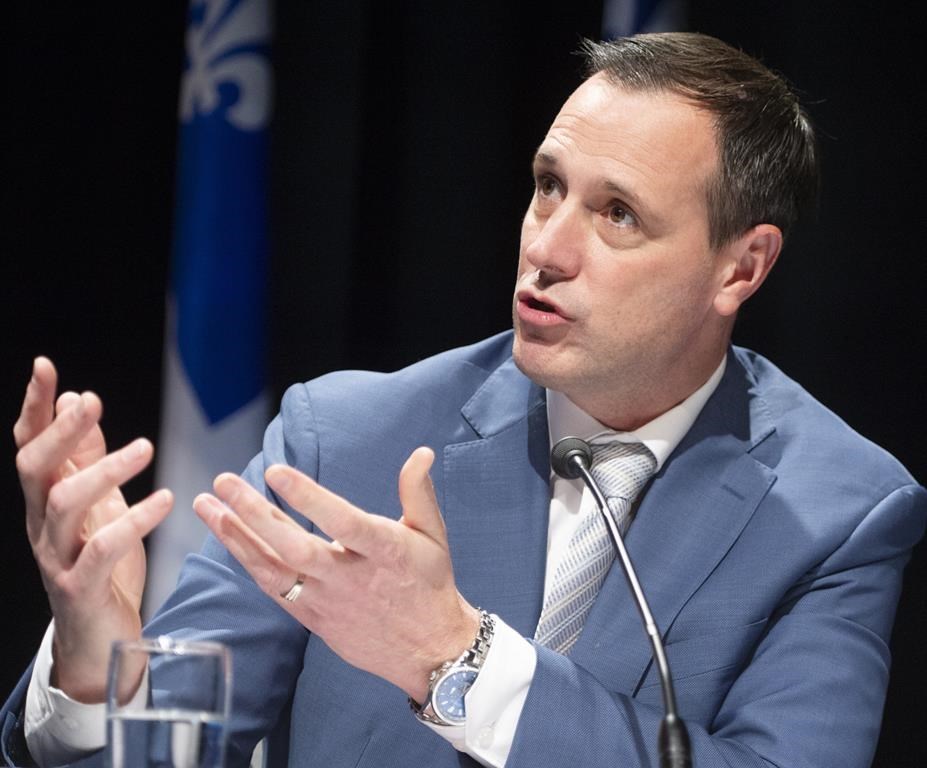MONTREAL — Quebec on Friday defended its decision to reopen schools despite soaring COVID-19 infections and related hospitalizations, with one public health official saying classrooms aren't the primary drivers of transmission.
The government announced new measures this week to curb rising infections, including an 8 p.m. curfew beginning Saturday, but chose to reopen primary schools as scheduled Jan. 11 and high schools a week later.
Education Minister Jean-Francois Roberge told a news conference Friday there was a "fairly strong consensus" in the province to reopen schools as quickly as possible after the winter break because of their importance to children's overall well-being.
Dr. Richard Masse, strategic health advisor to the government, told reporters that schools aren't driving COVID-19 transmission in Quebec; rather, he said, they are a reflection of the virus's spread in the community.
While he said there were intense discussions within the province's Health Department regarding when schools should reopen, he said he believes it's ultimately unfair to punish children, especially those in elementary school, who he said depend on classrooms for learning, mental health and socialization.
"The kids are kind of victims in that situation right now, so that’s why we want to place the measures on the places where the higher risk of transmission occurs — and this is not in primary schools," Masse said.
"I don’t mean there’s no transmission: there (is) transmission, there have been outbreaks, there could be outbreaks still. We’re taking all the measures to control them very rapidly, but they are limited, and they’re not the cause of the actual situation."
Government data indicates that as of Thursday, there were 103 active outbreaks tied to schools. The data says schools have accounted for about 24 per cent of all non-active outbreaks in the province — second only to workplaces.
Masse said that while transmission undoubtedly occurs in schools, more than 50 per cent of new cases reported across Quebec originate in the home or at small gatherings.
Primary students will now have to wear masks in hallways and in common areas while those in Grades 5 and 6 will have to wear them in class. High school students, who also have to wear masks in class, will be provided two surgical masks a day.
Roberge said the ventilation systems in a sample of schools had been tested and that the results have been reassuring. He said the results, released Friday, indicate the average air quality tested fell within provincial standards. About three per cent of classrooms, he said, were deemed "problematic," adding that the problem in those classes will be urgently addressed or students would be moved elsewhere.
He said the ventilation systems across the province's roughly 3,000 schools will be tested.
Masse said the province had convened a panel of experts to study ventilation in schools and said they had advised against installing air purifiers in classrooms. He said there isn't enough evidence purifiers prevent the transmission of viruses, adding that they can be noisy, lead to a false sense of security and that they could even be harmful if improperly installed.
The English Montreal School Board, which independently chose to purchase purifiers, said Friday it "stands behind its decision" to proceed with the installation of the equipment in 30 schools.
Quebec reported 2,588 new COVID-19 infections and 45 more deaths attributed to the novel coronavirus on Friday, including 14 that occurred in the past 24 hours.
Health Minister Christian Dube said hospitalizations increased by 23, to 1,403, and 207 people were in intensive care, a rise of five. The province also ramped up its vaccination campaign, with 13,971 doses of vaccine administered Thursday.
Roberge said the return to class in the fall was an overall success, but said more resources are needed to help teachers, parents and students. Therefore, he said, the government has decided to cancel ministerial exams this year, and will launch a tutoring service in the coming weeks to help students who are falling behind. He said qualified people, including retired teachers and education students, were encouraged to sign up.
Other measures he announced Friday included allowing teachers to delay issuing first report cards, and also included providing computers or tablets to students who need them, as well as adding more resources for learning and for mental health.
He said students will only be issued two report cards instead of three, and that the second would be weighted more heavily in order to allow students who were struggling to catch up.
Associations representing public school boards, private schools and school administrators applauded Friday's announcement. One group representing parents' committees said it was happy to see measures to support student success, but urged the government to release more details about its plan and to move as quickly as possible.
This report by The Canadian Press was first published Jan. 8, 2021.
Morgan Lowrie, The Canadian Press

